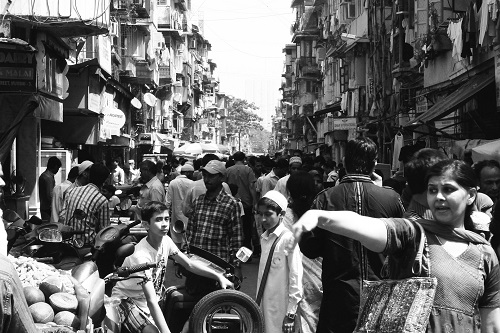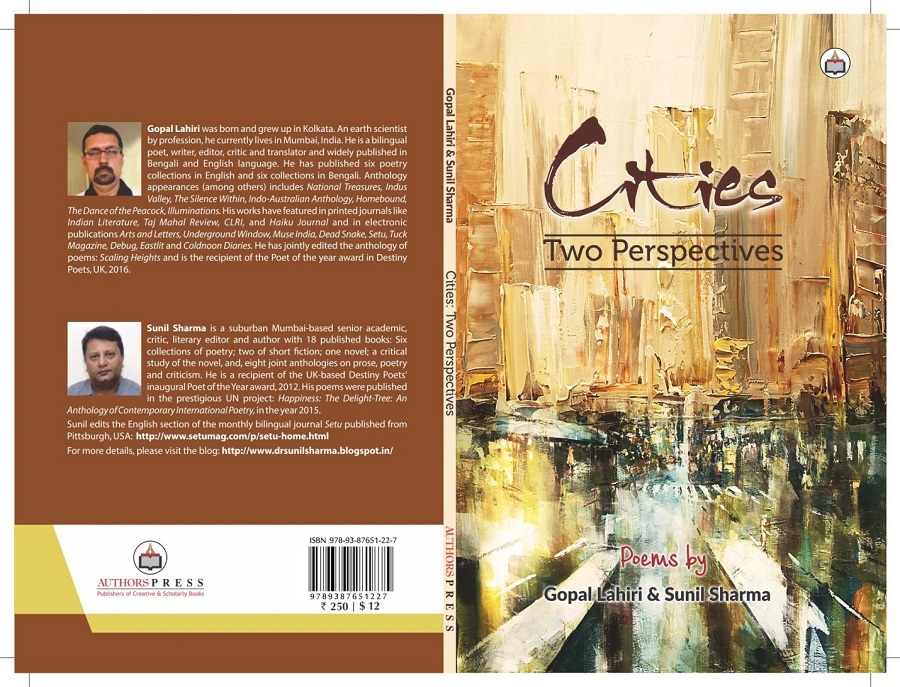
By
Bhaskaranand Jha Bhaskar
‘Cities: Two Perspectives’, a collaborative poetry collection by Gopal Lahiri and Dr. Sunil Sharma, both noted and celebrated poets of contemporary times, deals with the themes of city, urbane life and its surroundings. The book reflects two different perspectives on the life in Mumbai and its suburban regions. Both the poets have contributed thirty poems each, with different viewpoints. In fact, city is a brilliant metaphor used in the book with various connotations. Following the poetic tradition of great Indian English poets such as Nissim Ezekiel, Dom Moraes, Adil Jussawalla, Gieve Patel, Arun Kolatkar, the poet duo also deal, in the collection, with the theme of urbanity, identification with metropolitan environment and describe Mumbai paradoxically, capturing the reality of this city in contemporary contexts. In the Foreword, U Atreya Sarma, the eminent poet and editor, rightly writes-“The poetic duo….. capture the colour and contours, the sound and silence, the face and pace, the grime and grace of the behemoth Mumbai, its round-the-clock light as well as its dark patches…. the varied moods of the city, from dawn to dusk to midnight to dawn; from its sea to its interior land, from the top of its skyscrapers to the bottom of its subterranean crannies, from its metropolitan core to the suburban fringes.”
Mumbai symbolises modern urban life with all its complexities. As the most advanced city of India, Mumbai is symbolic of civilization, advancement and progress. However, in view of deteriorating human conditions and burgeoning onslaught of materialism, commercialization, dehumanization taking its toll, Nissim Ezekiel calls it a “Barbaric city sick with slums/ Deprived of seasons, blessed with rains…” To Dom Moraes, it is ‘a gritty, impossible and unforgettable place’ full of ‘child beggars, pavement sleepers and sprawling urban slums; noise, tangled traffic, skyscrapers, fashionable apartment blocks; the very poor, who have migrated from villages …to seek better fortune ; and the very rich – merchants, industrialists, film stars’. Gopal Lahiri discovers ‘another city, hidden and blessed, shrouded in mystery and magic’ out of the commercialized and consumerized city of dust and concrete jungle. He highlights ‘special virtues of the metro and its suburban fringes, adding charm and vibrancy.. As true poetic and creative mind, he smells goodness even in the ‘filth and squalor’ thus presenting the beautiful landscape of Mumbai. On the other hand, Dr Sunil Sharma brings to the fore ‘varied landscapes, moods, settings and sentiments’ as his poetic responses to this megapolis called Mumbai. The city of Mumbai, to him is both exasperating and euphoric. As a matter of fact, Mumbai is a city of contrasts and contradictions. However, both the poets ‘are evidently linked by emotional chord’. There is a profound sense of urban sensibility in their poems.
In the first half of the book, Gopal Lahiri, a bilingual poet, writer, editor, critic and translator and widely published in Bengali and English language., explores the world of nature in the haze and maze of the city. He picturesquely adds various colours and sounds to the vivid description with the objects of nature. “Mahim Sun”, “Juhu Beaqch”, “Madh Island”, “Mumbai Dawn”, “Worly Sea Face”, etc are some of his remarkable poems in this respect. They present picturesque description of scenic beauty of important places of Mumbai. He calls the city “atmospheric’. In Blue Whistlers”, the poet observes minutely daily activities of urban life- milkman supplying milk door to door, the train arriving late, the people enjoying sun bath etc. Amidst all this he never forgets to peep into the world of birds- pigeons and sparrows, the Gulmohar tree on the gate in addition to ‘morning rays’ after ‘charcoal night’, the shadows, ringing of the cycle bells and ‘the tweets of those tiny blue whistlers’. Forgetting all the ‘scars and wounds’ of the city life, the poet prefers to be ‘alone, silent’ in the ‘sprawling island city’. In his next poem “Juhu Beach” the poet himself avers:
This morning I hear the bells and whistles
Away from the roads and streets
The fair weather is only peeling clouds
Lahiri’s poetry encompasses a sense of resentment and reconciliation and never shows signs of strong protests as he believes that ‘all muted murmurs sail through high tides’, though there is ‘a sense of struggles/ Of its own against the tyranny of life’. To illustrate this aspect of his poetry, the poet depicts an optimistic picture of an old lad , smiling at the rising sun, ‘after crossing the sleepless night’, with her ‘fractured mind’.
In addition to idealistic views of cities and urban life in the backdrop of scenic beauty of nature, we also find in his poetry twisting turns of conflicts and contrasts, bitterness and decadence of urban life, and shock and disgust at the growing dehumanisation of the city. He presents the paradox of city life in his oxymoronic poem “Cold Fire” –
Water stops flowing in the municipal tap
Holding the roof in rain, the brick and stone
Monsoon puddles go long into the winter
In this filthy muddy lane
Besides the above lines highlighting the day to day problems of common people- the urban poor- the following lines from the same poem reveal the hollowness of urban existence with an eloquent irony:
Shivers and lies still children are there
With their little or nothing, toy stories and pet cats,
More often than not,
Rattle with a hollowness
Through his poetry, Lahiri exposes the poverty of street people enveloped in the glittering facade of city lights. He shows his sympathy with such people, sheltered, unclothed, and unfed, with bleak future of their children. However, he never loses hope. He writes in “Thirst”:
Padlocked shacks, windowless tin boxes,
Excitement on the road. The homeless,
Naked, slum children are there on the road,
Waiting for the clouds to drain the last drop of rain.
Gopal Lahiri very skilfully interweaves elements of nature with his experience and expresses the anguish and lamentation of the people sobbing behind the strong walls of skyscrapers. His “Mansion” makes us hear the moaning sounds:
Amid shafts of light
entering through the opaque window,
the rusty images of the blue and green sea
wet with moaning,
the sound of the high tides
almost furrowed into the walls.
He is saddened to see that there is no supervision of the ‘unknown settler or the native’, neglected outside the big mansions, though painted with ‘the tribal art’. The poet exposes the hollow life of the rich dwellers. Nevertheless, the poet comes to terms with the stern realities of city life. Hoping for the best he philosophises his deep concern:
Good and evil each other, suspect, only suspect
bundles into sleep in secret miseries,
I carry on my conversation about
the loss and separation or shouting of air
even the daunting emptiness loves to grow and heal inside.
His “Skywalk” is a very sensitive write with undercurrents of irony, paradox and contrasts. The poet voices his ennui of urban living – be it by the rich or the slum dweller. He is disillusioned to see ‘the young boys’ smoking ‘not so cheap cigarettes’. He also finds ‘Swarms of migrant waders, blood in their eyes’ fighting with and abusing each other ‘unknowingly’. His poetic heart is full of grief to see the distance and distinction getting wide and wider between the two people. The poet, however, gets philosophic and concludes as a way of disposal of this sort of agonising common sights:
But this is not about you,
it’s the truth in the frail formless world,
Of unspeakable, of the unrecorded idioms,
To weigh up
In the middle of a hole
Something like the absolute.
In this way we see that Gopal Lahiri, in his poems, celebrates variegated facades of nature engulfing the city life, with soothing sights and sounds, colors and squalor, with patches of human predicament and reconciliation.
II
In the latter half of the book comes up the poems of Dr Sunil Sharma. A bilingual critic, poet, literary interviewer, editor, translator, essayist and fiction writer Dr. Sharma tends to be more realistic and prosaic in the treatment and portrayal of life in Mumbai. To him, cities are fascinating. Those dwelling in the cities, he holds, are ‘part of the expanding landscape’. Thus, his poetry is ‘engagement with varied landscapes, moods, settings and sentiments’ of the people living in Mumbai, be it Main or Extended. He candidly and picturesquely depicts the reality around them. He believes that there is no escaping from such hard realities. In his poem “Spaces” he says-
Certain cities hold you back.
Others expel- unwittingly, perhaps!
Some –beckon demurely- as a maiden,
in love but afraid of the wicked world, outside
her shuttered suburban/rural home in India- on march
to the hungry markets of global economy.
His “Exit” gives an overview of hurly burly life in thickly populated city of Mumbai with Breathless’ and ‘bloated’, ‘tired faces’ buffeted by a sea breeze, hot and humid’, cars over-packed. Commuters look lost in the crowds, with ‘Bulging briefcases’, ‘folded dailies’, and ‘sweat-drenched hankies. He is amazed at the ‘City being ballooned’ and ‘badly gasping’. He compares the city people to a kite ‘suspended between a live wire and a polluted sky’. He writes:
Local trains,
Hurtling
Up
Down
In a frenzy.
Mumbai—
Maniac
Energetic,
A bit reclaimed by everybody.
In “Dusk” dealing with the nightlife of city, he raises the issue of traffic snarl, a big problem to the people. He says-
‘From a flyover—you cannot fly over as most get choked most of the time—the swathes look dazzling’, though ‘Mumbai streets are paved with gold’. He calls nights “drunk” sprawled ‘on the corner of busy street’.
Dr. Sharma expresses his bewilderment at the sight of various people ‘identical’ in appearance, ‘similes, gestures, inflections, perfumes, goggles’ yet multiple factions, ‘distinct’ and ‘ disparate’, a;; ‘dissolved in groups’ like ‘incongruent lines’ of ‘the same compass’. In “Separateness”, he reveals of them as
Aloof
Silent
Eyes downcast
Fiddling apps with racy fingers
Darting eyes
Or shouting on the phone
Voice terribly rising ion decibels
Over the maddening din
Of an Indian town about to burst
Around its belly
The above poem offers an overview of the modern citizens caught in the multitudes of multi-media and gadgets. The crowds of the people are “Moving as a kinetic mass across urban spaces/ Like loose ice shelves in the Antarctica”. The poet opines that the description holds good for ‘every culture in a globalised world’.
Dr. Sharma, like Gopal Lahiri, is a great poet of observation. Cacophony of city life doesn’t escape from his observation. In the poem “Drilling”, he touches upon the theme of cacophonous life in a city. The city dwellers have ‘no respite from the staccato sound’. He finds the cities and their people undergoing ‘transformation 24×7- all the year round!’. Another poem “Lucky” is full of sarcastic and caustic expressions echoing the cacophony of automobiles and traffic of “suburban Mumbai streets’. Amid such meaningless noises, the ‘voice of a myna’ so sweet and natural, is better.
“The City Life” presents routine of the city life- from dawn to dusk, with vivid description of the activities and the time. The poet, in his next poem “Beach” reveals that ‘holiday on the beaches’ of Mumbai is ‘only a consolation’. These poems, on the face of it, appear prose but are imbued with poetic feeling, evoking mixed responses.
“An Asian Metro Portrait” reflects the poet’s observation of and concerns for woman in cities. He sympathises with the “woman of the pavement’, who, ‘frozen but not paralyzed’, never loses hope-
In most hopeless settings,
Of demeaning life
On the streets,
Of
Crushing misery,
Grinding poverty and soul-killing existence.
On the other hand, he also observes working woman and woman as commuters ‘pounded daily by/Hungry feet of the marching men’. He writes-
Woman, these days, act like alpha men,
So, in the offices, these dolls are counted by their ogling bald bosses
And male co-train travellers,
As the new competitive men
Dr. Sharma laments the loss of greenery from the city because of onslaught of deforestation. In the poem “Requiem”, he remembers the scenic beauty now lost forever and juxtaposes its past state-full of verdant hills and trees, village, river- and the present plight sans all the natural beauty and bounty. He calls this big loss-
…. an irreparable loss-
A lost childhood and soothing green.
In “Sky-Islands”, a beautiful poem, he depicts a scenic beauty of nature in the sky, comparing the floats of clouds to an island moving, which offers ‘a natural sight’ to the dwellers down. He sketches-
A gigantic hand
Unseen moves fast
And
Creates enchanting forms
In the vast sky, a vivid canvass;
There are strewn around
The golden islands
His “Roofless” has a pathetic portrayal of struggling birds and striving folks of people in modern city, reflecting ‘geo/cultural affinity’ and ‘kinship’. Another heart-wrenching scene of the poor slum dwellers is presented in “Fellowship of Pain’, a very short poem –
An army of slum kids
Running after the duo (mother and child)
Feet bare, some half-clad;
An extended family of the underdogs!
On a closing note it must be mentioned that ‘Cities: Two Perspectives’ by Gopal Lahiri and Dr. Sunil Sharma, is imbued with their sense of urbanity, reflecting two different perspectives on the city life. Both the poets have different viewpoints expressed in their appealing and engaging poems presenting before a reader a unified, dignified, versified text, super-text, structure and superstructure of urban landscape. While living far away from their homeland, they have lived city life, experienced its good and bad aspect, observed its beautiful and ugly milieu and thus voiced their feelings and thoughts evolved in the metropolitan environment through their encapsulation. They don’t tend to escape from the hard-hitting realities of the milieu they live in, rather undeterred by the tedium of urban living they confront the contemporary urban realities with Indian mind and heart. Tone and tenor, as employed by them, deserve accolades. Both the poets have skilfully made use of effective poetic diction, and evocative and stirring imagery and symbols. In short, the book under review is an experiential and lyrical diary of existential living against the hurly-burly, din and bustle of life in a modern city pregnant with contrasts and paradoxes.
Cities: Two Perspectives, Gopal Lahiri & Sunil Sharma, Authorspress, New Delhi, 2018
Gopal Lahiri
Gopal Lahiri was born and grew up in Kolkata, India. He is a bilingual poet, critic and writer and widely published in Bengali and English language in India and abroad. He has six poetry collections in English and jointly edited the anthology of poems: Scaling Heights. He can be reached at [email protected], https://www.facebook.com/glahiri and https://twitter.com/gopallahiri.
Sunil Sharma
Sunil Sharma is Mumbai-based senior academic, critic, literary editor and author with 19 published books: Six collections of poetry; two of short fiction; one novel; a critical study of the novel, and, eight joint anthologies on prose, poetry and criticism, and, one joint poetry collection. He is a recipient of the UK-based Destiny Poets’ inaugural Poet of the Year award—2012. His poems were published in the prestigious UN project: Happiness: The Delight-Tree: An Anthology of Contemporary International Poetry, in the year 2015.
Sunil edits the English section of the monthly bilingual journal Setu published from Pittsburgh, USA:
For more details, please visit his blog.
Bhaskaranand Jha Bhaskar
Bhaskaranand Jha Bhaskar is a multilingual poet (Maithili, Hindi and English), short story writer, critic and reviewer, based in Kolkata. He is regularly published in various national and international magazines, both printed and online. His poetry springs straight from heart and mind as unification of sensibility. He uses catchy lines, expressions and images. In his poetry, social issues, romance and love are tackled with equal passion. Resonant with profound spirituality and intricate mysticism his poems are stunning and enlightening, buoyant sometimes and intense at other times and always have a deep meaning beautiful enough to touch hearts of avid readers. One of his poems on Nelson Mandela is included in the academic syllabus prescribed for the school students of Philippines.
Soothing Serenades: Straight From the Heart is his first volume of poems and Two Indias and Other Poems is under publication. He is also a contributor to journals like The Criterion: An International Journal in English, IJML (International Journal On Multicultural Literature), The Anvil (Forum of Literature & Academic Research in English) and Harvests of New Millennium, The Interiors, Taj Mahal Review, IJES (The Indian Journal of English Studies). He is also a part of several anthologies like ‘Epitaphs’, ‘Purple Hues”, “Whispering Winds”, “Just For You, My Love”, “Heavenly Hymns”, ‘I Am a Woman”, “The Significant Anthology”, “Umbilical Cords”, “A- Divine-Madness” (Five Volumes), “Poetic Prism” – 2015, 16, 17 & 18, “Searching For Sublime” (Australian-Indo Poetry), “She the Shakti”, “Whispering Heart”, etc.
He is also the Review Editor of Asian Signature, a literary e-journal, managed from Kolkata.





No Comments Yet!
You can be first to comment this post!